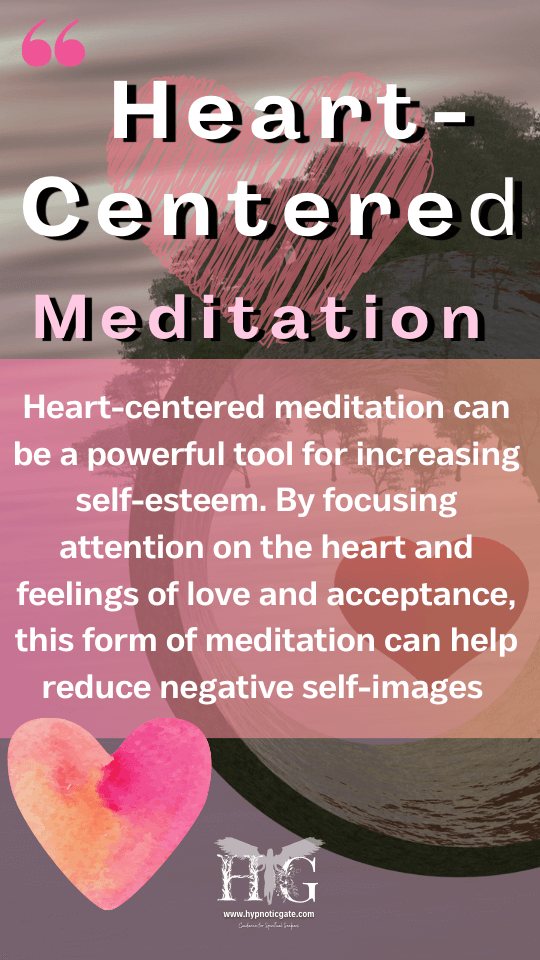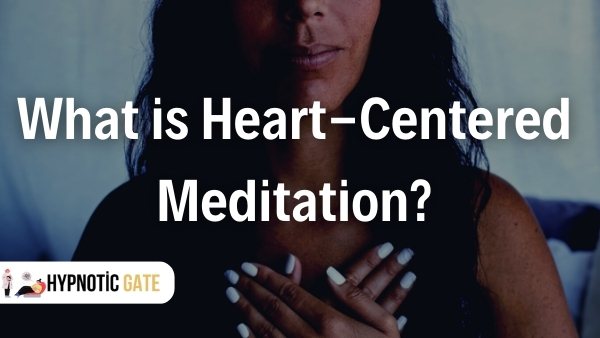
The heart chakra, which is the seat of emotional harmony and self-love, is the focus of the meditation technique known as “heart-centered meditation.” It uses what has been known as an emphasis on one’s emotions of love, compassion, and appreciation for both oneself and other people.
This kind of meditation can assist in reducing anxiety while encouraging relaxation and self-assurance. Many also discover that adding meditation music or guided meditations that emphasize self-worth and self-love to their routine is beneficial.
Let’s discover more about the Heart-centered Meditation
“When we practice heart-centered meditation, we open ourselves up to the possibility of experiencing profound changes in our lives and in the world around us.”
Things You Should Know About Heart-Centered Meditation:
Heart-centered meditation can be transformative. Here’s why:
- Boosts Kindness: Practicing this meditation amplifies your sense of compassion, making you a kinder person.
- Sharpens Emotional Focus: It allows you to zero in on your feelings, fostering deeper emotional connections.
- Increases Self-Love: You start appreciating yourself more, building self-esteem and confidence.
- Cuts Down Worry: The practice helps you release anxiety and find more peace.
- Encourages Unconditional Love: This is not about judging; it’s about loving freely and fully.
- Enhances Well-Being: Overall, it cultivates a sense of inner calm that enriches your life in every aspect.
The Science Behind Heart-Centered Meditation
According to research, practicing meditation daily can lower stress hormone levels like cortisol, which can be beneficial for both physical and mental health.
Also, studies have shown that meditation can lower blood pressure, enhance heart health, boost emotions of well-being, and enhance general quality of life. Incorporating meditation into your daily practice is a quick yet effective technique to encourage better health and happiness.
“By focusing our awareness on the heart and its powerful energy, we can release negative emotions and experience a deep sense of inner peace.”
Heart-Centered Meditation And Self-esteem

Heart-centered meditation can be a powerful tool for increasing self-esteem. By focusing attention on the heart and feelings of love and acceptance, this form of meditation can help reduce negative self-images and increase positive self-perception.
Guided meditation for self-esteem and the heart is a common technique to help individuals develop a more loving and accepting attitude towards themselves. During this type of meditation, an instructor guides participants through a series of exercises to increase awareness of the heart and its power.
Through regular practice of Heart-Centered Meditation, one can experience an increase in self-esteem, greater mental clarity, and an increased sense of balance and harmony in life.
How Does Heart-centered Meditation Improve Self-esteem and Reduce Anxiety?
| Aspect | Correct Belief | Common Misconception |
|---|---|---|
| Purpose | Boosts self-esteem and emotional well-being | Solely for relaxation |
| Method | Focus on the heart chakra and emotions | Just another form of mindfulness |
| Benefits | Increases compassion, self-love, and emotional focus | Only reduces stress |
| Inclusivity | Suitable for everyone, regardless of experience | Only for spiritually advanced people |
| Scientific Backing | Supported by studies showing reduced stress hormones | No scientific evidence |
Heart-centered meditation is a kind of self-discovery and growth that may have a significant positive influence on your mental and emotional health.
You may build a more understanding and loving connection with yourself by learning to tune in to your thoughts, feelings, and sensations. This can assist you in overcoming negative self-talk, lowering self-doubt, and boosting your general confidence and sense of self-worth.
Heart-centered meditation can be a valuable method for lowering anxiety and tension and improving self-esteem. The body’s relaxation response is triggered when you concentrate on your breath and heart center, and this can aid in lowering your blood pressure and stress hormone levels.
“Gratitude makes sense of our past, brings peace for today, and creates a vision for tomorrow.”
– Melody Beattie
Therefore, think about trying heart-centered meditation if you want to increase your self-confidence and decrease your emotions of worry. You may develop a stronger sense of inner calm and well-being that will improve every aspect of your life with effort and practice.
Can Heart-centered Meditation Reduce Stress and Anxiety?
Heart-centered meditation can help you feel less anxious and stressed. This exercise can assist in triggering the body’s relaxation response and quieting the mind by concentrating on the heart center and breathing. Also, it helps foster sentiments of self-awareness, self-acceptance, and empathy, all of which can lessen stress and anxiety. Frequent meditation practice can also help you better control your emotions and difficult situations in everyday life.
Gratitude Can Open Your Heart, And You Can Feel Good
You may encourage your mind to concentrate on the good elements of life and develop an appreciation for what you have by engaging in mindfulness and gratitude exercises.
This can assist in lessening materialistic feelings and improve happiness and a sense of fulfillment. Gratitude has also been associated with elevated serotonin levels in the brain, which may enhance mood and general well-being. Thus, practice thankfulness each day and let the wealth of sound in your life fill your heart.
- Improves mental health: Gratitude exercises have been associated with a decrease in depressive and anxious symptoms and an improvement in general well-being.
- Enhances relationships: You may improve connections and intimacy by showing others thanks.
- Promotes better sleep: Frequent thankfulness has been linked to longer and better-quality naps.
- Increases resilience: Those who practice thankfulness tend to have happier outlooks and are better able to handle difficulties and disappointments.
- Boosts physical health: According to research, practicing thankfulness may improve physical health by lowering inflammation and enhancing heart function.
“Gratitude is a powerful catalyst for happiness. It’s the spark that lights a fire of joy in your soul.” –
– Amy Collette
How to Maintain a Regular Practice of Heart-centered Meditation?
Meditating at least three times a week can be a good starting point. Begin slowly and take time to adjust to the practice, especially if you have any emotional issues that require recovery time.
ere’s a simple, step-by-step guide to maintaining a regular practice of Heart-Centered Meditation:
Step 1: Choose a Quiet Spot
Find a peaceful location where you won’t be interrupted. This space should be comfortable and free from distractions.
Step 2: Set a Schedule
Decide on a regular time to practice. Consistency is key, so aim for at least three times a week.
Step 3: Prepare Your Environment
Set the mood with some calming music or nature sounds. Use aromatherapy oils like lavender to create a soothing atmosphere if you like.
Step 4: Get Comfortable
Sit or lie down in a comfortable position. Make sure your back is straight to allow for deeper breathing.
Step 5: Body Scan
Before diving into the meditation, do a quick body scan. Notice any tension and try to release it.
Step 6: Focus on Your Heart Center
Close your eyes and turn your attention to your heart area. Imagine a warm, glowing light there.
Step 7: Breathe Mindfully
Inhale deeply, filling your lungs, and exhale completely. As you breathe, focus on feelings of love and compassion.
Step 8: Use a Guided Meditation (Optional)
If you’re new to the practice, you might find a guided meditation helpful. Choose one that focuses on self-love and emotional balance.
Find a consistent time and place to meditate without interruptions, and consider using music or guided meditations to help you relax and focus. It can also be helpful to have a meditation group or partner to hold you accountable and motivated. Remember to listen to your body and take breaks or adjust the practice as needed.
Related: Is Daily Meditation More Effective Than Other Methods for Preventing Constipation?
Other Techniques for Heart-Centered Meditation
Other techniques for heart-centered meditation include:
- Coherence-based meditation: To achieve coherence between the brain and heart, which can lessen stress and boost emotions of well-being, this therapy uses breathing and relaxation techniques.
- Mantra meditation: To focus the mind and instill a sense of calmness, this approach entails repeatedly using a word, phrase, or statement.
- Yoga meditation: This method encourages calmness and tranquility of mind and body via physical postures, breathing exercises, and meditation.
- Vipassana meditation: This Buddhist approach entails paying attention to the breath and bodily sensations to improve consciousness and insight.
- Walking meditation: To encourage relaxation and mental calm, this approach is walking silently while paying close attention to your body’s actions and being fully present.
All of these methods may help you manage your anxiety, boost your self-confidence, and relax more, and you can combine them with guided meditations or meditation music to make the practice even more successful.
Heart-centered meditation can help us connect with our inner wisdom and love, which can lead to increased joy and happiness in life
Question: Hypnoticgate Community About Heart Centered Meditation
Q: Thomas Valder Jackson from New York asks, “How can heart-centered meditation improve my life?”
A: Jennifer Anderson: Tomas, heart-centered meditation can be a game-changer. It not only lifts your mood but also hones your emotional intelligence.
Q: Mike from San Francisco wonders, “Can this type of meditation help with stress and anxiety?”
A: Jennifer Anderson: Absolutely, Mike! When you engage your heart chakra, stress and anxiety don’t stand a chance. It’s like wearing an emotional bulletproof vest.
Q: Emily from Chicago inquires, “Does science back up the benefits of heart-centered meditation?”
A: Jennifer Anderson: Great question, Emily! Research shows that this practice can actually reduce cortisol levels, the stress hormone. Think of it as your internal chill pill.
Q: David from Miami asks, “Can heart-centered meditation affect my physical health?”
A: Jennifer Anderson: David, you’re in for a treat. Focusing on your heart center uplifts your mood and benefits your ticker! It’s like a gym workout for your heart, minus the sweat.
Q: Lisa from Boston asks, “How do I know I’m doing it right? Is there a wrong way to do heart-centered meditation?”
A: Jennifer Anderson: Lisa, there’s no “wrong” way as long as you’re connecting with your heart space. So, no stressing, okay? Your heart knows what it’s doing.
Conclusion
Focusing on the heart center during heart-centered meditation is a powerful practice that helps people feel more relaxed, emotionally balanced, and physically well.
Several advantages of routinely using this strategy have been demonstrated by scientific research, including a reduction in the signs of anxiety and depression, an improvement in heart health, an increase in social relationships, and an improvement in sentiments of empathy and compassion.
Heart-centered meditation is easy to begin, and new practitioners can use a step-by-step manual to be sure they are doing it correctly. People can find even more considerable advantages for stress reduction and self-esteem by continuing regular practice and combining other methods like guided meditations. Heart-centered meditation is a valuable and approachable technique that may enhance mental and physical health.
Suggestion:
